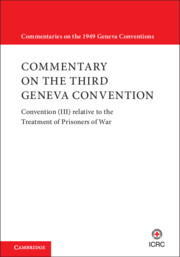 Commentary on the Third Geneva Convention
Commentary on the Third Geneva Convention from II - Disciplinary Sanctions
Published online by Cambridge University Press: 21 August 2021
Escape gives rise to a dilemma between two contrasting ideas. Thefirst is that attempts to escape may be viewed as a demonstration ofpatriotism and of the most honourable intentions, and not as acrime. According to this precept, prisoners of war have a right, amoral duty, and sometimes, under the law of the Power on which theydepend, even a legal obligation to escape. The second idea is thatan attempt to escape is a punishable breach of discipline vis-à-visthe Detaining Power, which it is under a strong obligation toprevent. These contrasting ideas have been described as the ‘paradoxof escape’, which is at the core of the legal framework onprisoner-of-war escapes.
To save this book to your Kindle, first ensure [email protected] is added to your Approved Personal Document E-mail List under your Personal Document Settings on the Manage Your Content and Devices page of your Amazon account. Then enter the ‘name’ part of your Kindle email address below. Find out more about saving to your Kindle.
Note you can select to save to either the @free.kindle.com or @kindle.com variations. ‘@free.kindle.com’ emails are free but can only be saved to your device when it is connected to wi-fi. ‘@kindle.com’ emails can be delivered even when you are not connected to wi-fi, but note that service fees apply.
Find out more about the Kindle Personal Document Service.
To save content items to your account, please confirm that you agree to abide by our usage policies. If this is the first time you use this feature, you will be asked to authorise Cambridge Core to connect with your account. Find out more about saving content to Dropbox.
To save content items to your account, please confirm that you agree to abide by our usage policies. If this is the first time you use this feature, you will be asked to authorise Cambridge Core to connect with your account. Find out more about saving content to Google Drive.